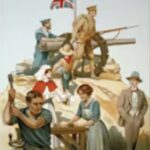Celia Donert, Cambridge (Web); Stefan-Ludwig Hoffmann, Berkeley (Web); and Michal Kopeček, Prague (Web)
Time: 08.-09.05.2025
Venue: University of Cambridge
Proposals by: 31.10.2024
Liberal internationalism, with its emphasis on individual rights and freedoms, civil society, democracy and good governance, open markets and the rule of law, has been criticised for the complex sexual politics which underpin these universalist principles. This workshop aims to start a conversation between historians and scholars from other disciplines about the sexual politics of liberal internationalism since the 1990s in a longer historical perspective.
That the ‘universal subject’ of political liberalism is implicitly gendered male is a feminist argument as old as liberalism itself; feminist scholars of international law have made similar arguments about liberal concepts of human rights or humanitarian law. Feminist theorists of twentieth-century international relations have suggested that sexual and international orders of masculinism and militarism are mutually constitutive, whether in the boardrooms of foreign policy establishments, on military bases, or in other local sites of intervention in the name of liberal internationalism. Postcolonial, gender and queer theorists continue to challenge the western, masculine and heteronormative bias of the latest iteration of liberal internationalism, which since the Cold War places greater emphasis on the universal rights of women and minorities, while limiting their application by resurrecting discourses of cultural relativism, humanitarian suffering and moral value.
This workshop aims to start a conversation about the sexual politics of liberal internationalism after 1989 in Central Europe and beyond. The focus on Central Europe is driven by a desire to explore the rise and fall of liberal internationalism in the late twentieth century outside the Anglo-American world. Central Europe became a laboratory for experiments in international economic or political order during the twentieth and twenty-first centuries, from the collapse of multinational empires, the rise and fall of democratic, fascist and state-socialist regimes, until the political and economic transformation that followed the 1989 revolutions. The conjunction between liberal internationalism and neoliberalism adds another dimension to the question of sexual politics in post-Cold War Central Europe, opening up space for comparisons with other parts of the world. Read more and source … (Web)

 Bonn Center for Dependency & Slavery Studies (BCDSS); Joseph Biggerstaff, Susan Broomhall, Kristie Flannery, Claudia Jarzebowski, Jessica O’Leary, and Lisa Phongsavath
Bonn Center for Dependency & Slavery Studies (BCDSS); Joseph Biggerstaff, Susan Broomhall, Kristie Flannery, Claudia Jarzebowski, Jessica O’Leary, and Lisa Phongsavath  Home Front Studies
Home Front Studies  Archiv für Agrargeschichte (AfA), Bern
Archiv für Agrargeschichte (AfA), Bern  Museum Niederösterreich: Haus der Geschichte
Museum Niederösterreich: Haus der Geschichte  Ehemalige Synagoge St. Pölten
Ehemalige Synagoge St. Pölten